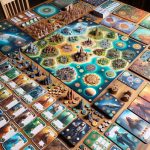Strategy board games for preschoolers offer a fun and educational way to engage young children in activities that promote critical thinking, problem-solving, and decision-making skills. These games are not only entertaining but also help in the development of cognitive abilities at an early age. By introducing preschoolers to strategy board games, parents and educators can lay the foundation for future success in academics and beyond.
Playing strategy board games at a young age has numerous benefits that go beyond just entertainment. These games help preschoolers improve their attention span, enhance memory retention, and develop logical reasoning skills. As children engage in strategic thinking during gameplay, they learn valuable lessons about planning, adapting to changing situations, and making informed decisions. This early exposure to strategic gameplay can set the stage for academic achievement later on.
Moreover, strategy board games offer a hands-on approach to learning that engages multiple senses, making it easier for preschoolers to grasp complex concepts. Through interactive play experiences, children can strengthen their spatial awareness, fine motor skills, and social skills.
Additionally, these games provide opportunities for bonding with family members and friends while fostering a sense of sportsmanship and fair play. For parents looking to enhance their child’s development in a fun and meaningful way, strategy board games are an excellent choice.
Benefits of Playing Strategy Board Games at a Young Age
Introducing preschoolers to strategy board games at a young age can have numerous benefits that extend beyond just entertainment. These games can help in the development of important cognitive skills that are crucial for their overall growth and learning. By engaging in strategic thinking, problem-solving, decision-making, and critical thinking through gameplay, preschoolers can enhance their mental abilities in a fun and interactive way.
One of the key benefits of playing strategy board games at a young age is the improvement in essential executive functions such as working memory, cognitive flexibility, and inhibitory control. These skills are crucial for academic success as well as social interactions later in life. Strategy board games provide a structured environment where preschoolers can practice these functions and learn how to plan ahead, adapt to changing circumstances, and exercise self-control – all important skills for their future development.
Furthermore, playing strategy board games can also foster important social skills in preschoolers such as collaboration, communication, turn-taking, and sportsmanship. By engaging with peers or family members in gameplay, children learn how to interact with others effectively while also having fun.
These social interactions not only enhance their emotional intelligence but also help them build stronger relationships with others. Overall, the benefits of playing strategy board games for preschoolers go beyond just entertainment – they lay the foundation for essential skills that will serve them well throughout their lives.
How Strategy Board Games Can Help Improve Cognitive Skills in Preschoolers
Playing strategy board games can have a significant impact on the cognitive development of preschoolers. These games are not only fun and entertaining but also help in enhancing various cognitive skills such as problem-solving, critical thinking, decision-making, and planning. By engaging in these games, children can improve their ability to strategize, adapt to new situations, and think ahead.
One of the key benefits of strategy board games for preschoolers is the development of their executive function skills. These games require players to plan their moves, consider different outcomes, and make decisions based on their goals. This process helps children learn how to focus their attention, control impulses, and manage multiple tasks simultaneously. As they engage in gameplay, preschoolers gradually strengthen their working memory and self-regulation skills.
Moreover, playing strategy board games can also enhance preschoolers’ social skills. These games often involve taking turns, following rules, and learning how to win or lose graciously. By interacting with peers during gameplay, children develop important social-emotional skills such as empathy, sportsmanship, cooperation, and communication. This not only enriches their overall gaming experience but also prepares them for better social interactions in various settings.
| Benefits of Strategy Board Games for Preschoolers | Key Points |
|---|---|
| Improves cognitive development | Enhances problem-solving abilities |
| Develops executive function skills | Strengthens working memory and self-regulation |
| Enhances social-emotional skills | Promotes empathy and cooperation |
Top 5 Strategy Board Games Recommended for Preschoolers
Strategy board games for preschoolers are not only a fun pastime but also a valuable tool for their development. These games help children improve their critical thinking skills, decision-making abilities, and social interactions. By engaging in strategy board games at a young age, preschoolers can learn to plan ahead, strategize, and adapt to different situations – all important skills that will benefit them in the long run.
One of the top strategy board games recommended for preschoolers is “Candy Land.” This classic game is not only colorful and engaging but also teaches young children how to follow directions and take turns. Another great option is “Guess Who?” which helps preschoolers develop deduction skills by asking yes or no questions to figure out their opponent’s mystery character.
For parents looking to introduce their preschoolers to strategy board games, “Sequence for Kids” is an excellent choice. This game enhances pattern recognition and matching skills while also introducing the concept of strategy through gameplay. Additionally, “Robot Turtles” is a fantastic game that introduces basic programming concepts in a fun and accessible way for young children.
Overall, strategy board games offer numerous benefits for preschoolers and can be a wonderful addition to their playtime routine. Not only do these games provide hours of entertainment, but they also facilitate skill-building in various areas such as problem-solving, memory retention, and social interaction.
| Game | Skills Developed |
|---|---|
| Candy Land | Following directions, taking turns |
| Guess Who? | Deduction skills |
| Sequence for Kids | Pattern recognition, matching, strategy |
Tips for Introducing Strategy Board Games to Preschoolers
Introducing strategy board games to preschoolers can be a fun and rewarding experience for both children and parents. By incorporating these games into playtime, children can develop important skills such as critical thinking, decision-making, problem-solving, and patience. Here are some tips to help parents successfully introduce strategy board games to their preschoolers:
- Start with simple games: Begin by choosing strategy board games that are designed specifically for young children. Look for games that have easy-to-understand rules and straightforward gameplay to prevent frustration.
- Make it fun and engaging: Create a positive and exciting environment when introducing strategy board games to preschoolers. Use colorful game pieces, incorporate storytelling elements, and offer praise and encouragement throughout the game to keep them interested.
- Set realistic expectations: Understand that preschoolers have short attention spans and may not grasp complex strategies right away. Be patient and supportive as they learn the rules and navigate the gameplay.
By following these tips, parents can make the process of introducing strategy board games to preschoolers enjoyable and successful. Encouraging children to engage in these interactive learning experiences can have numerous benefits for their cognitive development and set a solid foundation for future academic success. Remember, the key is to make learning through play a fun and rewarding experience for young minds.
Strategies for Parents to Engage Preschoolers in Playing Strategy Board Games
Engaging preschoolers in playing strategy board games can be a fun and rewarding experience for both parents and children. To ensure that your little ones are excited to participate in these games, here are some strategies for parents to consider:
- Start with Simple Games: Introduce preschoolers to strategy board games that are easy to understand and play. Choose games with colorful designs, simple rules, and short playing times to keep their attention.
- Be Patient and Encouraging: Understand that preschoolers may take time to grasp the concept of strategy in games. Be patient with them as they learn and make sure to offer praise and encouragement along the way.
- Make it a Positive Experience: Create a positive and enjoyable atmosphere while playing strategy board games with your preschooler. Use enthusiastic language, celebrate their successes, and emphasize the fun aspect of the game rather than just winning.
Playing strategy board games with preschoolers can also be an opportunity for bonding and quality time together. By following these strategies, parents can help develop not only their child’s cognitive skills but also strengthen their relationship through shared experiences.
Remember that the key is to make playing strategy board games a positive and engaging activity for your preschooler. By incorporating these strategies into your gameplay sessions, you can foster a love for strategic thinking early on in your child’s development. Explore different games, tailor your approach to fit your child’s interests, and most importantly, have fun together.
Importance of Supervision and Safety Measures When Playing Strategy Board Games
When it comes to playing strategy board games for preschoolers, supervision and safety measures are paramount to ensure a fun and safe gaming experience. Parents and caregivers play a crucial role in setting up guidelines and rules to create a secure environment for young children while they engage in these games. Here are some important aspects to consider when it comes to supervision and safety measures:
Setting Up Age-Appropriate Game Rules
It is essential to establish age-appropriate game rules that match the developmental stage of preschoolers. This includes simplifying instructions, limiting game duration, and ensuring that the gameplay is engaging yet not too complex for their understanding. By setting up clear guidelines, parents can help children navigate through the game effectively while keeping them safe.
Creating a Safe Gaming Environment
Ensuring a safe gaming environment is crucial when preschoolers are playing strategy board games. This includes organizing a designated play area free from hazards or distractions, such as sharp objects, small game components that could be swallowed, or any potential tripping hazards. Parents should also supervise closely to prevent accidents or mishaps during gameplay.
Teaching Good Sportsmanship
One essential aspect of playing strategy board games is teaching children about good sportsmanship. Parents can use this opportunity to instill values such as patience, taking turns, being gracious winners or losers, and following the rules of the game. By promoting positive behavior during gameplay, parents not only enhance their child’s social skills but also create a harmonious gaming atmosphere.
By implementing proper supervision and safety measures when preschoolers are playing strategy board games, parents can foster a nurturing environment for learning and development. Through guidance, clear boundaries, and encouragement of positive behavior, children can benefit greatly from these games while staying safe and having fun. Remember that interactive play under supervision can enhance family bonding and create lasting memories for both parents and preschoolers alike.
Resources for Finding Strategy Board Games Suitable for Preschoolers
When it comes to finding strategy board games suitable for preschoolers, there are a variety of resources available to help parents and educators make informed choices. One great resource is online parenting forums and websites dedicated to educational toys and games for young children. These platforms often have reviews and recommendations from other parents who have tried and tested different strategy board games with their own preschoolers.
Additionally, visiting local toy stores and game shops can provide hands-on experience with different strategy board games for preschoolers. Store employees are usually knowledgeable about the products they carry and can offer valuable insights on which games are age-appropriate and educational. Some stores even host game nights or demo events where families can try out various strategy board games before making a purchase.
Another helpful resource for finding strategy board games suitable for preschoolers is through educational websites and blogs that focus on early childhood development. These online resources often feature curated lists of the best strategy board games for different age groups, including preschoolers.
They may also provide tips on how to choose games that align with specific learning goals or developmental milestones for young children. Utilizing these resources can help parents make well-informed decisions when selecting strategy board games for their preschoolers.
Conclusion
In conclusion, the benefits of introducing strategy board games to preschoolers extend well beyond just providing entertainment. These games play a crucial role in fostering cognitive skills such as problem-solving, critical thinking, decision-making, and strategic planning at an early age. By engaging in these activities, children are not only having fun but also developing essential skills that will benefit them throughout their lives.
Furthermore, playing strategy board games with preschoolers can enhance their social and emotional development by encouraging communication, teamwork, and sportsmanship. Through these games, children learn to take turns, follow rules, and handle both winning and losing gracefully. These experiences help them build resilience and adaptability as they grow older.
As parents or caregivers, it is important to be actively involved in guiding and supervising preschoolers during gameplay to ensure their safety and maximize the learning opportunities provided by strategy board games. By choosing age-appropriate games and setting clear expectations, adults can create a positive gaming experience that stimulates children’s minds and promotes healthy social interactions.
Investing time and effort into incorporating strategy board games into a child’s routine can lead to long-term benefits in terms of intellectual growth and overall development.
Frequently Asked Questions
What Board Games Can a 4 Year Old Play?
A 4-year-old child can play board games that are simple, engaging, and age-appropriate. Some great options include Candy Land, Chutes and Ladders, Hi Ho! Cherry-O, and Guess Who? These games help develop skills such as taking turns and counting.
What Is the Most Popular Strategy Board Game?
The most popular strategy board game is undoubtedly Chess. Chess has been played for centuries and is beloved by players around the world for its complexity, strategic depth, and competitive nature. Other popular strategy board games include Settlers of Catan and Risk.
What Type of Game Is Appropriate to the Preschooler?
Games that are appropriate for preschoolers are typically those that focus on developing basic skills like matching, memory, colors, shapes, and fine motor skills. Examples of games suitable for preschoolers include Memory, Spot It!, Hoot Owl Hoot!, and Sneaky Snacky Squirrel. These games are not only fun but also educational in nature.

I love playing all kinds of games – from classics like Monopoly to modern favourites like Ticket to Ride.
I created this blog as a way to share my love of board games with others, and provide information on the latest releases and news in the industry.





